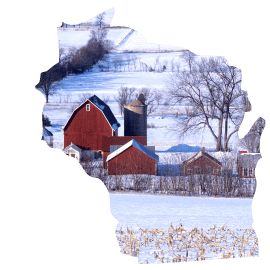Licensure Reciprocity: Wisconsin
Expanding the Pool of Teachers Policy
Analysis of Wisconsin's policies
Wisconsin does not support licensure reciprocity for certified teachers from other states.
Commendably, Wisconsin does not grant any waivers of its testing requirements. All out-of-state teachers, no matter how many years of experience they have, must meet Wisconsin's passing scores on licensing tests.
However, other aspects of the state's policy create obstacles for teachers from other states seeking licensure in Wisconsin. Teachers with valid out-of-state certificates are eligible for licensure in Wisconsin. Those with less than five years of experience are eligible for the initial educator license; those with five or more years may apply for the professional license.
Applicants must satisfy the state's recency requirement, meaning that out-of-state teachers not employed within the past five years prior to application must complete six semester hours of "refresher work." Transcripts are also required for all applicants; however, it is not clear whether the state analyzes transcripts to determine whether a teacher was prepared through a traditional or alternate route or whether additional coursework will be required.
In addition, Wisconsin requires all incoming teachers to complete courses in phonics, conflict resolution, minority group relations, Wisconsin American Indian Studies and environmental education. The state does not appear to offer test-out options for these courses.
Wisconsin is also a participant in the NASDTEC Interstate Agreement; however, the latest iteration of this agreement no longer purports to be a reciprocity agreement among states and thus is no longer included in this analysis.
Recommendations for Wisconsin
Offer a standard license to certified out-of-state teachers, absent unnecessary requirements.
Wisconsin should reconsider its recency requirement regarding experience, as it may deter talented teachers from applying for certification. In addition, transcript analysis is likely to result in additional coursework requirements, even for traditionally prepared teachers; alternate route teachers, on the other hand, may have to virtually begin anew, repeating some, most or all of a teacher preparation program in Wisconsin.
Wisconsin should also allow a test-out option for its lengthy coursework requirements.
Accord the same license to out-of-state alternate route teachers as would be accorded to traditionally prepared teachers.
Regardless of whether a teacher was prepared through a traditional or alternate route, all certified out-of-state teachers should receive equal treatment. State policies that discriminate against teachers who were prepared in an alternate route are not supported by evidence. In fact, a substantial body of research has failed to discern differences in effectiveness between alternate and traditional route teachers.
State response to our analysis
Wisconsin noted that it is currently developing a program approval process based on equivalency or experience. The state added that, currently, institutions of higher education can conduct a comparable review against their approved programs for such candidates.
Select another topic
Delivering Well Prepared Teachers
- Admission into Preparation Programs
- Elementary Teacher Preparation
- Elementary Teacher Preparation in Reading Instruction
- Elementary Teacher Preparation in Mathematics
- Middle School Teacher Preparation
- Secondary Teacher Preparation
- Secondary Teacher Preparation in Science
- Secondary Teacher Preparation in Social Studies
- Special Education Teacher Preparation
- Assessing Professional Knowledge
- Student Teaching
- Teacher Preparation Program Accountability
Expanding the Pool of Teachers
Identifying Effective Teachers
- State Data Systems
- Evaluation of Effectiveness
- Frequency of Evaluations
- Tenure
- Licensure Advancement
- Equitable Distribution
Retaining Effective Teachers
Exiting Ineffective Teachers
Research rationale
http://www.ncbex.org/ .

